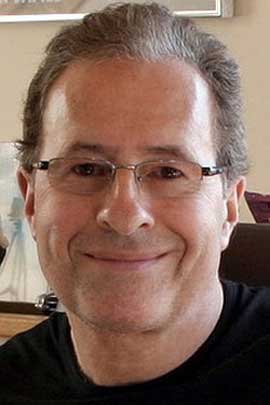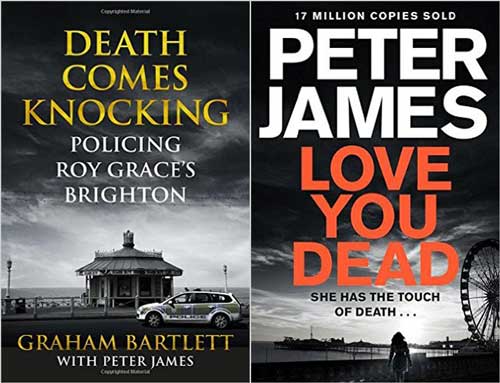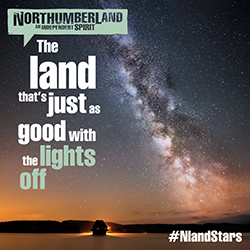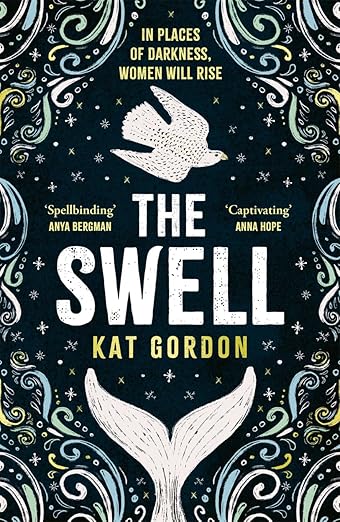Roy Grace’s Brighton
Peter James is Programming Chair for this year’s Theakstons festival and is interviewing both Martina Cole and is bringing the dark side of Brighton to Harrogate with an evening of seaside themed food and criminally good talk about all things Roy Grace, Brighton and more. So I hide inside one of the many marquees and tracked the man down for a little pre-dinner talk.
What is it about Brighton that makes it the ideal setting for your novels?
For me there was only ever one location for Roy Grace to be based….my hometown of Brighton. To the outsider, Brighton is a hip, beautiful seaside city, but it has a long history of darkness – right back to its roots as a smugglers village! In Regency days it gained a reputation both as a fashionable bathing resort, but in 1841 when the London-Brighton railway line opened, criminals flooded down from London, finding rich pickings and a much nicer environment than their city! They brought cock-fighting, prostitution, pick-pockets, muggers, smugglers, burglars, and gangs. Simultaneously, with the railway enabling quick access from London, many wealthy Londoners brought their mistresses down here and it became known as a place for “dirty weekends”.
BOOKTRAIL THE LOCATIONS IN ‘DEATH COMES KNOCKING’
BOOKTRAIL THE LOCATIONS IN LOVE YOU DEAD
Three consecutive past Chief Constables of Sussex Police have all told me that Brighton is the favoured place in the UK for first division criminals to live in. The reasons are: Firstly it has a lot of escape routes, very important to all criminals: It has the Channel ports, Eurotunnel, and Gatwick Airport just 25 minutes away. London is only 50 minutes by train. It has a major seaport on either side – Shoreham and Newhaven, perfect for importing drugs and exporting stolen cars, antiques and cash.
It has the largest number of antique shops in the UK – perfect for laundering stolen goods and cash. For many recent years it held the title the Tourist Board do not like me mentioning: “Injecting Drug Death Capital of England”! It has a wealthy young population combined with the largest gay community in the UK, providing a big market for recreational drugs. It has two universities, so a big drug-taking student community. A huge number of nightclubs and a large transient population. Very importantly it has not been over-written by other writers. The only previous author to delve seriously into its criminal underbelly – and quite brilliantly, was Graham Greene in ‘Brighton Rock’ in 1938.
In a tour around Brighton, where would Roy Grace take us?
I (and Roy Grace!) would take you on a tour of our favourite 10 places…
Brighton Pier.
Formerly known as the Palace Pier, this and the Royal Pavilion, below, are the two iconic buildings of the city. It is a beautiful pier to look at, and the views back towards the city as you walk along it are spectacular in any weather.
The Royal Pavilion.
This is a truly stunning and extraordinary building, and one that has endlessly fascinated me. A farmhouse, given the world’s greatest ever makeover by King George 1V, to impress his mistress, Maria Fitzherbert, and built with a “double skin” so that servants could move around unseen, it’s banqueting hall contains what was, at one time, the world’s largest chandelier, suspended above the dining table. Several members of the Royal family used to be too nervous to sit beneath! And guess in which PJ novel it comes crashing down…
Shoreham Port
This port has played such a part in Brighton’s history, going right back to its earliest roots as Brighthelmstone, a renowned smuggling village.
The Undercliff walk.
There are actually two, one which begins at the Volks Railway terminus at Black Rock, the other which begins at Rottingdean. This second one is my favourite. I used to love roller-skating along a child, avoiding the pebbles and larger stones thrown over the sea wall during storms, and the chunks of chalk that lay broken in places. I particularly loved to come here – and still do – on a high tide during a high wind, when the sea breaks wildly, sending spray high into the air.
The Arches
These curious, spaces, half cave, half tunnel, occupied by fishermen, sailing cubs, cafes, restaurants, gift shops and art galleries along the seafront have endlessly fascinated me, and to me a quintessential part of Brighton seafront. On a fine summer’s day, nowhere is the city more alive than down here, underneath the arches…
Devil’s Dyke
Claimed to have been created by the Devil himself, in order to flood Brighton, which always gave it a frisson to me, as an impressionable child, the Devil’s Dyke – along with Firle Beacon a few miles to the East, and Seven Sisters further along – is one of the most beautiful places I have been to, anywhere in the world. Period. Drive over and around it, walk it, breathe it in, and just stare at it in wonder. I can never tire of it. My mother was a keen walker and I have so many happy memories of hiking over it on Sunday afternoons, summer and winter.
The Lanes.
You cannot mention the world Brighton, without its many criminal associations springing to mind. Graham Greene’s Brighton Rock captured brilliantly the pre-War darkness of the place, and no where do you feel it more than wandering the labyrinth of narrow streets lined with shops. Once they were almost all antique furniture and bric-a-brac shops, but with the decline in fashion of so-called “brown furniture”, many of the shops now sell coins, antique and modern jewellery, and many have turned into cafes and boutiques. In former days The Lanes was the first place the police and homeowners alike would head to the morning after a burglary – and often as not recover goods.
Bohemia.
A city is always in flux. Old favourites wither and occasional new places thrive and suddenly feel part of the city you have always known. Bohemia is like that – it is a great array of spaces, inside and outside, fun food, great cocktails and a nice attitude. As Brighton as a stick of rock.
Grand Hotel.
She truly is the grand old duchess of Brighton, and with the recently revamped restaurant space, GB1, the lady has suddenly and highly successfully reinvented herself as one of the coolest venues in town! The IRA blew it up, but it came back even more majestic than ever. And you get a ringside view of one of Brighton’s most iconic sights – the rotting remains of the West Pier – another of my favourite childhood haunts.
English’s.
Brighton has more restaurants than you can shake a pizza carton at, but for sheer character, none can match the timeless institution that is English’s. The whole place gives the impression that it is steadily falling down, and has been falling down for a hundred years, and will still be falling down in a hundred years time, by when the owners might have decided to give it a lick of paint and renew the carpet, but I hope not. It is perfect as it is. Sit outside one a summer’s day with a glass of cold Chablis and a plate of shellfish and feel the vibe of Brighton all around you. Sit inside on a winter’s eve, and feel the history of the city seeing through its walls.
And with that I join Peter and Roy for the booktrail of all booktrails!And for a hearty pre-dinner snack at English’s first. Well booktrailing can be hungry work!
Booktrail Boarding Pass Information:
Twitter: @peterjamesuk
Facebook: /peterjames.roygrace
Web: peterjames.com






